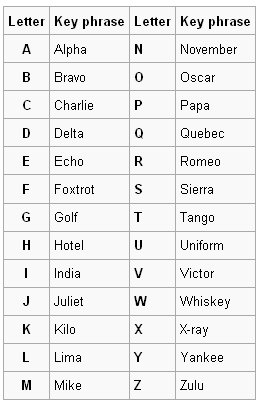One weakness with the English alphabet is that when they are spelt out aloud, some letters are too similar and end up being confused. For example, B sounds like D and M sounds like N. Although this is not too major an issue in normal life, it becomes very problematic when giving important information over the phone, such as an identification number. The same problem applies in the military where precise orders are required. To overcome the issue of similar-sounding letters, many systems have been developed to replace the letters with words when spelling words aloud over the phone or radio. For example, if the ID number EFS9201 has to be told to the other person, it can be read as “echo-foxtrot-sierra-nine-two-zero-one”. It is also used in the military to say abbreviations, such as “oscar mike” for “on the move”. As the spelling alphabet system is designed so that no two words sound similar, it is a very effective way of accurately transmitting information over the phone.
The spelling alphabet (NATO phonetic alphabet) is as follows:



